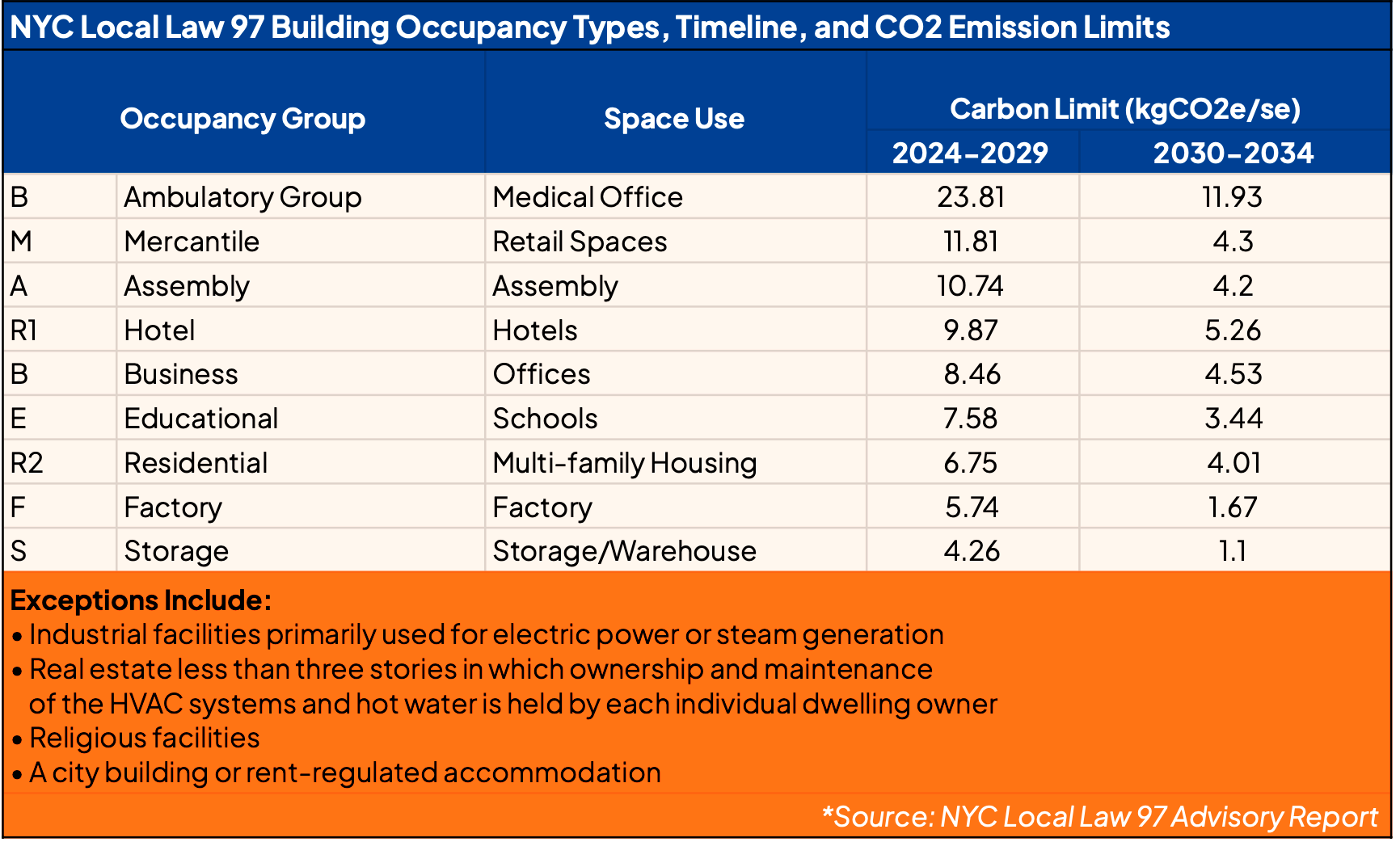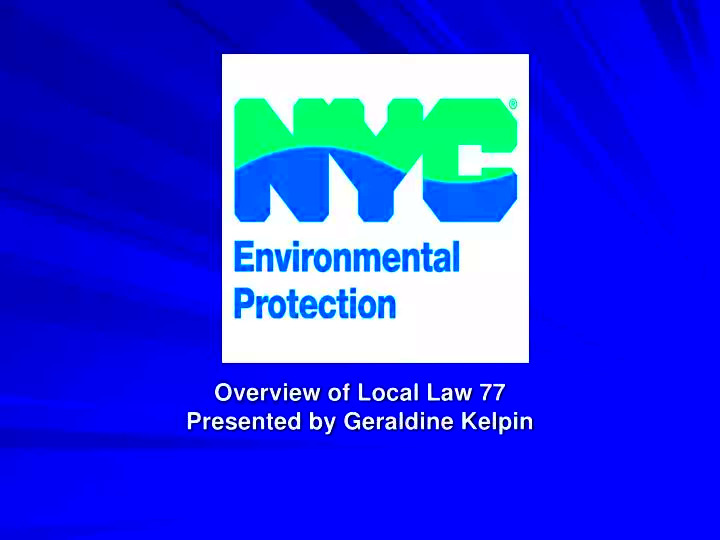Local Law 77 Explained
Local Law 77 is an essential regulation aimed at improving environmental quality and public health. It focuses on specific measures that govern construction, building maintenance, and related activities to minimize pollution and protect the local community. Whether you are a property owner, contractor, or simply living in an area affected by construction, this law plays a vital role in ensuring that everyone adheres to certain standards for a cleaner, safer environment.
What is Local Law 77 and its Purpose?

Local Law 77 was enacted to address concerns about emissions from certain construction activities, particularly related to the use of equipment like boilers and generators. The law specifically targets the reduction of harmful pollutants, such as particulate matter (PM) and nitrogen oxides (NOx), that are released into the air during construction or maintenance work.
The primary purpose of Local Law 77 is to ensure that older, more polluting fuel-burning equipment is phased out and replaced with cleaner alternatives. This not only helps improve air quality but also reduces health risks for those living and working in affected areas. The law is part of a broader effort to make urban environments more livable by tackling pollution at its source.
In summary, the goal of Local Law 77 is to safeguard public health by promoting cleaner air and regulating harmful emissions. It encourages the use of environmentally friendly practices in construction and maintenance, benefiting everyone in the community.
Key Requirements Under Local Law 77

Local Law 77 sets out several critical requirements that property owners and contractors must follow. These requirements are designed to minimize the environmental impact of construction activities. Below are some of the key points:
- Use of Ultra-Low Sulfur Diesel (ULSD): Any construction equipment must operate using ULSD fuel, which produces fewer emissions compared to regular diesel.
- Emission Controls: Equipment must be fitted with emission control devices, such as diesel particulate filters, to capture harmful pollutants.
- Maintenance Records: Property owners and contractors are required to maintain records of compliance, including fuel types and equipment maintenance schedules, for inspection.
- Replacement of Older Equipment: Older, non-compliant equipment must be replaced or retrofitted to meet the current standards set by Local Law 77.
Failure to adhere to these requirements can result in penalties, so it is crucial to follow them carefully. The law is not only about reducing emissions but also about ensuring that equipment used in construction is up to date and environmentally safe.
Who is Affected by Local Law 77?

Local Law 77 primarily affects property owners, contractors, and businesses involved in construction and maintenance work. If you own a building, operate a construction company, or manage a facility with fuel-burning equipment, you must ensure that your operations comply with this law. The regulation covers a wide range of industries and individuals, making it a critical law for many stakeholders.
Here’s a breakdown of who is most directly impacted:
- Property Owners: If you own a building or facility where construction or renovation is taking place, you are responsible for ensuring that contractors use compliant equipment and fuel.
- Contractors and Construction Companies: Companies that operate heavy equipment like boilers and generators during construction projects must adhere to the fuel and emissions standards outlined in Local Law 77.
- Facility Managers: If you manage a property or facility that utilizes fuel-burning equipment, whether for heating or maintenance, compliance with Local Law 77 is essential.
- Public Entities: Even city-owned or government-operated facilities are required to follow these regulations to ensure the public’s health and safety.
Essentially, anyone responsible for construction equipment or activities that generate emissions is impacted. Compliance isn’t just about avoiding penalties—it also helps contribute to cleaner air and a healthier environment for all.
Compliance and Penalties for Violations

Compliance with Local Law 77 is crucial to avoid penalties and ensure the safety of the surrounding community. The law lays out specific guidelines, and failure to meet these requirements can result in hefty fines or other consequences. The Department of Environmental Protection (DEP) is responsible for monitoring and enforcing compliance, and they have the authority to inspect sites and equipment.
Here’s what happens if you violate Local Law 77:
- Fines: The most common penalty for non-compliance is a monetary fine. These fines can vary depending on the severity of the violation, ranging from minor infractions to substantial penalties for repeated offenses.
- Work Stoppage Orders: In some cases, the DEP can issue a stop-work order, effectively halting construction activities until compliance is achieved.
- Equipment Seizure: Non-compliant equipment may be seized or prohibited from being used until it meets the requirements.
- Legal Consequences: Persistent non-compliance can lead to legal action, which could result in additional fines or even lawsuits.
To avoid these penalties, it’s important for property owners and contractors to stay up-to-date on their compliance status. Keeping accurate records and conducting regular equipment checks can go a long way in ensuring that your operations meet the standards of Local Law 77.
Steps to Ensure Compliance with Local Law 77
Ensuring compliance with Local Law 77 is not as complicated as it may seem, but it does require proactive management. By following a few clear steps, property owners and contractors can avoid penalties and contribute to a cleaner environment. Here are some key steps to ensure compliance:
- Conduct an Equipment Audit: Begin by identifying all the equipment that falls under the regulation. This includes boilers, generators, and any other fuel-burning machinery. Determine whether these machines are compliant with Local Law 77’s standards for fuel type and emissions.
- Upgrade or Retrofit Non-Compliant Equipment: If you have older equipment that doesn’t meet the law’s requirements, consider retrofitting it with emission control devices or replacing it with newer, compliant machinery.
- Use Ultra-Low Sulfur Diesel (ULSD): Ensure that all fuel-burning equipment is using ULSD fuel. This fuel type is mandatory under Local Law 77 and significantly reduces harmful emissions.
- Maintain Compliance Records: Keep detailed records of all equipment maintenance, fuel purchases, and emissions testing. These records should be readily available for inspection by authorities.
- Train Your Team: Educate your staff and contractors about the requirements of Local Law 77. Proper training will help ensure that everyone is aware of their responsibilities and understands how to maintain compliance.
By following these steps, property owners and contractors can stay compliant, avoid penalties, and play a role in improving air quality in their communities.
Common Misconceptions About Local Law 77
Despite being in place for some time, there are still many misconceptions surrounding Local Law 77. These misunderstandings can lead to non-compliance or unnecessary concerns. Let’s address a few of the most common misconceptions to provide clarity.
Here are some of the most frequent misconceptions:
- “Only large construction projects need to comply.” This is false. Local Law 77 applies to a wide range of projects, including smaller renovations and maintenance activities that use fuel-burning equipment.
- “Old equipment is exempt from the law.” Some property owners believe that older equipment is grandfathered in and does not need to be updated. However, this is not true. Non-compliant equipment must be retrofitted or replaced to meet the law’s standards.
- “Penalties are minor and not worth worrying about.” While fines might seem small for a first offense, repeated violations can lead to larger financial penalties, work stoppages, and legal issues.
- “Using any diesel fuel is fine as long as equipment is modern.” Local Law 77 specifically requires the use of Ultra-Low Sulfur Diesel (ULSD). Even new equipment must use this cleaner fuel to comply with the regulation.
- “The law only applies during working hours.” Compliance with Local Law 77 is required at all times, regardless of whether equipment is used during the day or at night.
Understanding these misconceptions can help property owners and contractors avoid mistakes and ensure full compliance with the law.
How Local Law 77 Impacts Property Owners and Contractors
Local Law 77 significantly impacts both property owners and contractors, requiring them to adopt new practices and upgrade equipment. While the changes can seem overwhelming at first, the long-term benefits for both public health and the environment make compliance worthwhile.
For property owners: You are responsible for ensuring that any work done on your property complies with Local Law 77. This includes hiring contractors who use compliant equipment and fuel. Property owners must also keep accurate records of the fuel used, maintenance performed, and any equipment upgrades. Compliance with the law ensures that your building projects run smoothly without interruptions or fines.
For contractors: The law requires you to follow strict guidelines on fuel usage and emissions control. You may need to invest in new equipment or retrofit older machines to meet current standards. Additionally, contractors are responsible for maintaining proper records, conducting emissions tests, and using Ultra-Low Sulfur Diesel (ULSD). This may involve added operational costs, but it is necessary to avoid legal penalties and ensure client satisfaction.
In essence, Local Law 77 requires a proactive approach from both parties. While it may involve initial costs and effort, the law helps protect the environment and keeps construction activities in compliance with health and safety regulations.
Frequently Asked Questions about Local Law 77
Many people have questions about Local Law 77, especially those who are just learning about its requirements. Below are answers to some of the most frequently asked questions.
| Question | Answer |
|---|---|
| What kind of fuel is required under Local Law 77? | Local Law 77 mandates the use of Ultra-Low Sulfur Diesel (ULSD) in all fuel-burning equipment. This fuel reduces harmful emissions and helps protect air quality. |
| Does the law apply to all types of construction equipment? | Yes, the law applies to any fuel-burning equipment used for construction, including boilers, generators, and other machinery that produces emissions. |
| Are there any exceptions to Local Law 77? | While there are no blanket exemptions, some equipment may qualify for a temporary variance. However, this requires approval from the Department of Environmental Protection and must be justified with valid reasons. |
| What records do I need to keep? | Property owners and contractors must keep detailed records of the fuel used, equipment maintenance, and compliance checks. These records must be available for inspection upon request. |
| What happens if I don’t comply? | Non-compliance can result in fines, work stoppages, or even legal action. It’s important to stay up-to-date with the law’s requirements to avoid penalties. |
Understanding these common questions can help you navigate the requirements of Local Law 77 more effectively and ensure you remain compliant.
Final Thoughts on Local Law 77 Compliance
Complying with Local Law 77 may seem challenging at first, but it is an essential part of promoting cleaner air and protecting public health. Both property owners and contractors have a shared responsibility to follow the law’s guidelines. From using Ultra-Low Sulfur Diesel (ULSD) to maintaining detailed records, every step ensures a reduction in harmful emissions and contributes to a healthier community.
By proactively upgrading equipment, keeping accurate compliance documentation, and training teams on the law’s requirements, property owners and contractors can avoid penalties while playing a key role in creating a safer environment. The initial investment in compliance may seem significant, but the long-term benefits for health, safety, and avoiding costly fines far outweigh the challenges. Ultimately, Local Law 77 is about balancing the demands of construction with the need to protect the environment and public health, making compliance both a legal necessity and a social responsibility.


